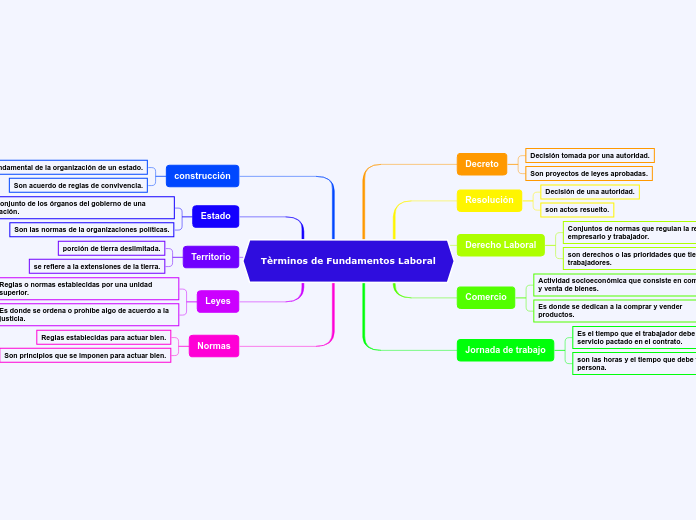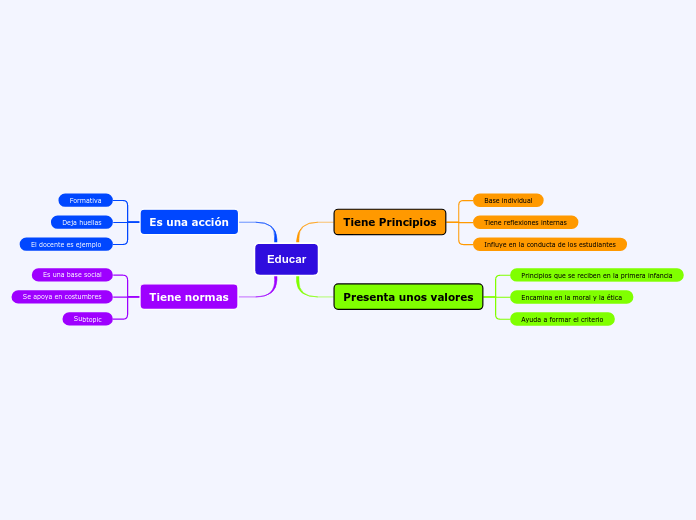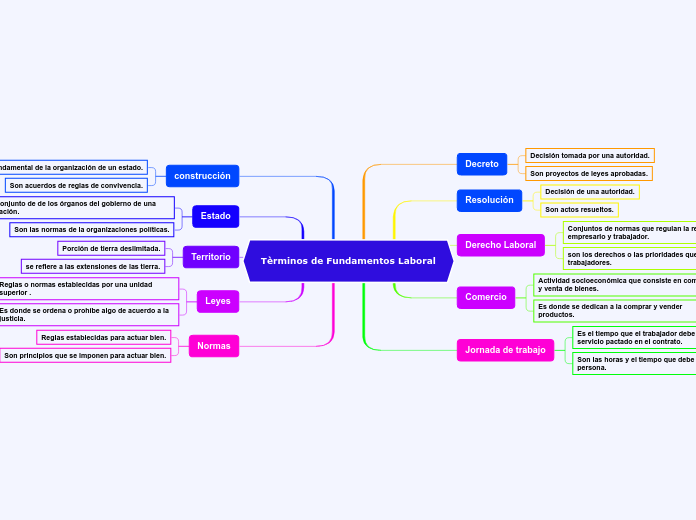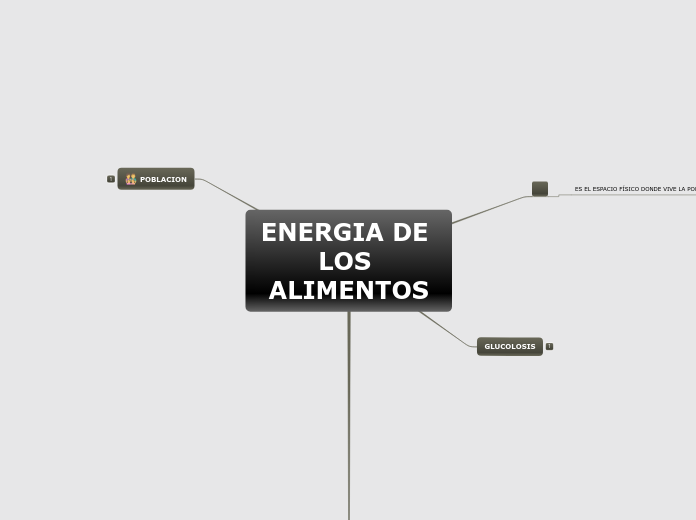Tèrminos de Fundamentos Laboral
Normas
A conjunction is a word like 'if' 'but' or 'and' which is used to connect sentences or clauses together.
Son principios que se imponen para actuar bien.
Subordinating conjunctions are conjunctions that are used at the beginning of subordinate clauses. Some examples of these conjunctions are: although, after, before, because, how, if, once, since, so that, until, unless, when etc.
Reglas establecidas para actuar bien.
Coordinating conjunctions always connect phrases, words, and clauses. They are: for, and, nor, but, or, yet, so.
Leyes
A preposition is one of the most exciting parts of grammar. A preposition is used to describe the location of something in relation to something else.
Es donde se ordena o prohíbe algo de acuerdo a la justicia.
A group of words used with the force of a single preposition is called phrase preposition.
Reglas o normas establecidas por una unidad superior.
Participle preposition consists of words that end in “ing”.
Territorio
An interjection is used to express emotion in a sentence.
Think of other interjections!
se refiere a la extensiones de la tierra.
porción de tierra deslimitada.
Estado
An adverb is used to describe a verb, but it can also describe an adjective or another adverb.
Adverbs normally help paint a fuller picture by describing how something happens.
Son las normas de la organizaciones políticas.
Conjunto de los órganos del gobierno de una nación.
construcción
A numeral is a word or phrase that describes a numerical quantity.
Some theories of grammar use the word 'numeral' to refer to cardinal numbers that act as a determiner to specify the quantity of a noun, for example the 'two' in 'two hats'.
Son acuerdo de reglas de convivencia.
Ley fundamental de la organización de un estado.
Jornada de trabajo
An article is a word used to modify a noun, which is a person, place, object, or idea. Technically, an article is an adjective, which is any word that modifies a noun.
son las horas y el tiempo que debe trabajar una persona.
Indefinite articles are the words 'a' and 'an.' Each of these articles is used to refer to a noun, but the noun being referred to is not a specific person, place, object, or idea. It can be any noun from a group of nouns.
Es el tiempo que el trabajador debe destinarse al servicio pactado en el contrato.
It refers directly to a specific noun or groups of nouns.
Comercio
A pronoun is a word that can be used in place of a noun, typically after the noun itself has already been stated.
Es donde se dedican a la comprar y vender productos.
Unlike demonstrative pronouns, which point out specific items, indefinite pronouns are used for non-specific things. This is the largest group of pronouns. All, some, any, several, anyone, nobody, each, both, few, either, none, one, and no one are the most common.
Actividad socioeconómica que consiste en comprar y venta de bienes.
Relative pronouns are used to add more information to a sentence. Which, that, who (including whom and whose), and where are all relative pronouns.
Derecho Laboral
An adjective is a word that's used to describe a specific noun and to provide more detail to the listener.
son derechos o las prioridades que tiene los trabajadores.
Superlative adjectives demonstrate a higher level of comparison between entities.
Conjuntos de normas que regulan la relación entre empresario y trabajador.
Expresses a comparison between two entities or groups of entities in quality or degree.
Resolución
A noun is defined as a person, place, thing or idea. Proper nouns always begin with a capital letter. Common nouns, which are general words, such as 'cars,' are not capitalized.
son actos resuelto.
Compound nouns are words where two nouns have been stuck together to make a new noun. Compound nouns should be written as one word, without a hyphen.
Decisión de una autoridad.
A noun which refers to a group of things/people.
Decreto
A verb is an action word or 'doing' word that signifies movement in some way.
Son proyectos de leyes aprobadas.
A modal is a type of auxiliary (helping) verb that is used to express: ability, possibility, permission or obligation. The main modal verbs in the English language are: can, could, may, might, must, shall, should, will, would.
Decisión tomada por una autoridad.
A verb with its own meaning: a verb that is not an auxiliary verb.









